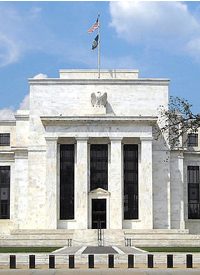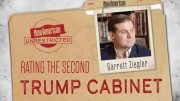
On the one hand, “mainstream Republicans” are described by CNN’s Jack Cafferty as “apoplectic” over the prospect of Ron Paul winning the caucuses in Iowa. On the other hand, the whole party has fallen captive to the 12-term Congressman’s “radical ideology,” according to Gary Weiss on the “progressive” web site Salon.com.
“The Republican Party, falling deeper into the clutches of Ron Paul’s "radical ideology," has a new item on its anti-populist agenda: Castrate the Federal Reserve so that it no longer can promote job growth,” Weiss wrote in Thursday's column. Weiss is, well, appalled at “the extent to which Ron Paul's fixation with the Fed has infected the Republican party. Anti-Fed rhetoric, once the province of "ultra-right" (on popularly cited fallacious political spectrums) groups like The John Birch Society, has gone mainstream with the rise of Paul, who has been surging in the polls and now ranks third behind Mitt Romney and Newt Gingrich. He is actually leading in Iowa, and a victory there would really rev up his famously loyal followers.”
Those loyal followers, as well as other Americans, might also be a little negatively revved up about about the report of a Government Accountability Office on the Federal Reserve Bank, issued in July of this year, showing the Fed had secretly lent some $16 trillion to domestic and foreign banks since 2008. That and other revelations about the workings, secret and otherwise, of the private banking network has heightened interest in curtailing the powers of the Fed, if not abolishing it, as Paul recommends. Indeed, as Weiss noted, End the Fed is the title of one of the several books Paul has authored in recent years — books his “famously loyal followers” and other interested readers have turned into best sellers. Others of the presidential candidates, while not calling for abolition, have called for limiting the power of the Federal Reserve in various ways.
Two days after entering the presidential race in August, Texas Gov. Rick Perry said, “I'll take a pass on the Federal Reserve right at the moment to be honest with you,” when asked for his thoughts on the subject during a campaign stop in Iowa. By the end of the ABC/Yahoo debate on Sioux City on December 10, he publicly thanked Rep. Paul for having opened his eyes to the workings of the Fed and the dangers they pose to the economy. Newt Gingrich has said he would “fire” Fed Chairman Ben Bernanke, whose term expires in 2014, and has suggested stripping the Federal Reserve of its banking powers. Michele Bachmann has said the Fed should be “shrunk back down to such a tight leash that they're going to squeak.” Rick Santorum has also joined the chorus of Federal Reserve critics. The one “holdout,” Weiss notes, is Mitt Romney, whose benign neglect of the subject has made the Federal Reserve “one of the few issues about which he hasn't flip-flopped — yet.”
But it isn't just among the party's presidential candidates that anti-Fed sentiment is growing. Last year all of the Republicans and a third of the Democrats in the House of representatives signed on to Paul's bill for an independent audit of the agency. Brent Budowsky of The Hill ridiculed Speaker of the House John Boehner of Ohio and Majority Leader Eric Cantor of Virginia for what Budowsky called “their low-concept imitation of Ron Paul” by warning against a further expansion of the money supply in an attempt to boost the economy. But what prompted Weiss's anguished defense of the Fed in Thursday's posting is a bill being drafted by Rep. Kevin Brady of Texas, ranking Republican on the congressional Joint Economic Committee. Brady has announced that his bill would end the Fed's dual role of fighting both inflation and combatting unemployment. That would leave the Federal Reserve with the singular role of maintaining a sound dollar, a task in which the agency has had very limited success since it was created by Congress in 1913.
The dual mandate, Weiss points out, was established in 1977, when the Federal Reserve Act was amended to require the agency to control the monetary supply and interest rates “so as to promote effectively the goals of maximum employment, stable prices, and moderate long-term interest rates.” The Fed is thereby required to consider not only how its policies will affect inflation, but the effect they will have on the economy as a whole. “In other words, the dual mandate is just common sense,” Weiss insists. “It’s not terribly controversial, either, unless you’re really indifferent to throwing people out of work.”
But in assessing the effectiveness of “the dual role,” it might be worth recalling what occurred in the years that followed its adoption in 1977. By the end of that decade, we had double-digit inflation and rising unemployment, giving rise to the term “stagflation” to describe an economy that was stagnant while the cost of living was rising at an annual rate of 13 percent a year. The “misery index” — a combination of the unemployment and inflation rates — was up over 20 percent. Savings were being wiped out and investment discouraged, adding to the unemployment rolls. By 1982 unemployment had climbed to more than 10 percent. It was only by the Fed's applying the brakes to the money supply, squeezing inflation out of the economy, that the dollar began to recover and unemployment came back down, setting the stage for the economic growth of the latter part of the 1980s.
To be sure, the Arab oil embargo of 1979 contributed for a time to the rise in consumer prices. But the Fed's expansion of the money supply (inflation) in the exercise of its dual role should not be overlooked or forgotten. And the members of Congress who mandated the dual role no doubt expected the Fed to be especially helpful in election years by providing artificial and temporary boosts to the economy to create the illusion of prosperity and help incumbents win reelection.
But artificial bubbles eventually burst, and the expansion of the money supply and record-low interest rates set by the Federal Reserve — along with legions of bad loans approved by government-sponsored mortgage agencies Fannie Mae and Freddie Mac — contributed mightily to the financial meltdown of 2008. The fact that Ron Paul predicted at the time those policies were being pursued that they would lead to such a collapse no doubt has much to do with the fact that his views on the Federal Reserve are catching on, with voters as well as elected officials. What troubles some “progressive” journalists is that at least some “mainstream Republicans” are no longer willing to verbally shoot or even ignore the messenger.
They may even be getting the message.
Photo: Federal Reserve System headquarters (Eccles Building) in Washington, D.C.



